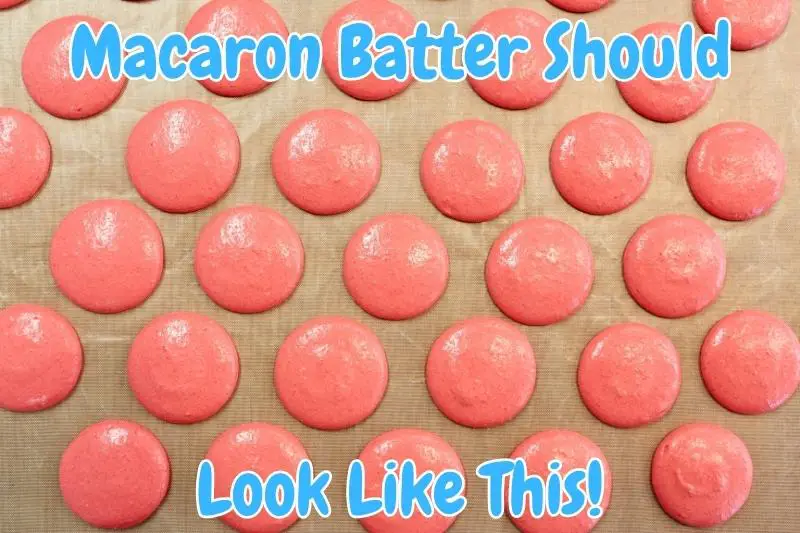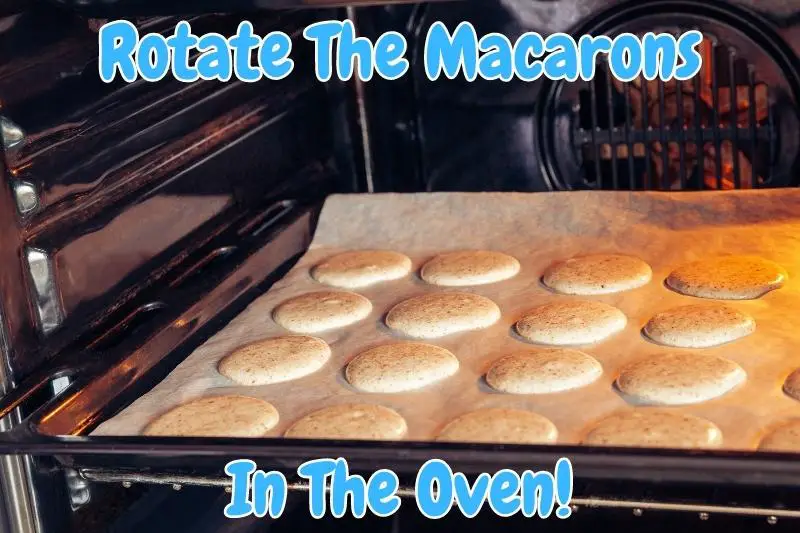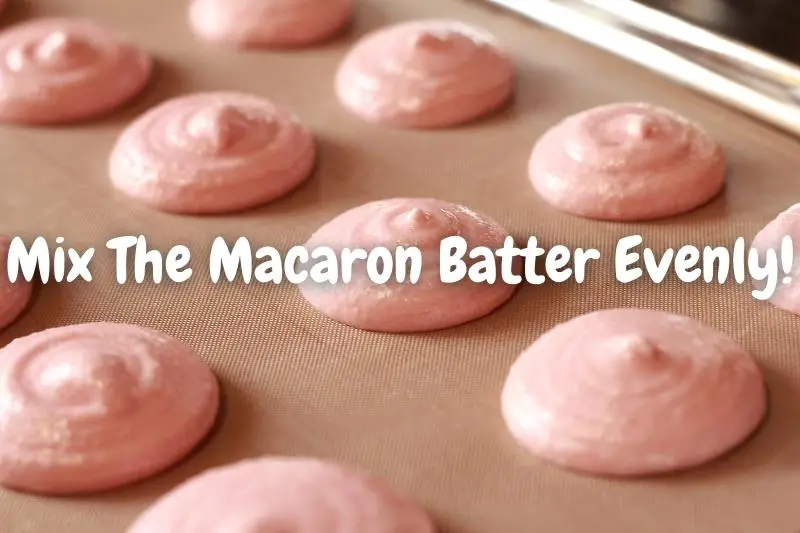This post contains affiliate links.
Macarons are delicate and delicious desserts that can be quite tricky to make for anyone in the kitchen. One of the most common problems with macarons is that they crack on top!
As a whole, macarons crack on top when there’s too much air in the batter. Overbeating macaron batter adds excess air pockets into the mixture making them crack as they bake. The excess air causes the macarons to rise too quickly while baking which then makes them crack on top.
I’ve experienced many cracked macaron tops over the years, it almost felt impossible to get right! After much experimentation, I have figured out the best ways to fix and prevent them from happening.
Why Did My Macarons Crack On Top?
Macarons are one of the most difficult desserts to master because of all the things that could go wrong. One of the most common problems is a cracked top which is always a nuisance!

Here are some of the major reasons for macarons cracking on top:
- The Egg Whites Were Overbeaten
- Underbaking/Overbaking
- Excess Moisture In The Macaron Batter
- The Macaron Batter Was Overmixed
- Batter Didn’t Rest Enough
- The Oven Was Too Hot
Even though there are many factors that could affect the famous smooth tops of macarons, there are simple ways to prevent them from ever happening.
The Egg Whites Were Overbeaten
When you overbeat the egg whites, it adds too much air to the batter. This causes the macarons to rise too quickly and then crack. So make sure to NOT overbeat the egg whites while mixing the batter!
The purpose of whipped egg whites is to provide stability and structure to baked goods like macarons.
If you overbeat them, the foam becomes too dry and stiff to work with which is why cracks occur.
*By the way, I wouldn’t be able to fix my runny buttercream frosting if I didn’t have the right type of mixer. For this situation, I used a 5-Speed Electric Hand Mixer which can get the job done! You can check out the Hand Mixer I use on Amazon!
The Macarons Were Underbaked or Overbaked
This is what happens when you don’t pay attention to the baking time. If you under-bake or overbake your macaron mixture, it will crack.
Underbaking will cause the macarons to be gooey on the inside and overbaking will make them tough.
Underbaking means that the macarons retain a lot of their moisture which causes them to expand too quickly.
The quick expansion causes cracks!
Overbaking, on the other hand, is the exact opposite. Too much moisture is evaporated which causes the cookies to be dried out. This results in cracked tops!
*By the way, I recently wrote an article explaining Why Your Macarons Could Turn Out Crunchy When Done. In this article, I break down all the different ways to fix and prevent overly crunchy macarons in every scenario. You can check out this article here!
Excess Moisture In The Macaron Batter
If there is too much moisture in the batter, it will cause the macarons to crack.
This is because the moisture turns into steam when it hits the hot oven and causes the macarons to rise too quickly and then crack.

I always had the old-fashioned parchment paper roll in my kitchen but I recently came across a Box of Heavy Duty Flat Parchment Paper Sheets that work great without trying to rip the perfect sheet which never seems to work out. These sheets come in different sizes to fit your pans! You can check out these parchment sheets on Amazon!
The Macaron Batter Was Overmixed
Just like overbeating the egg whites, overmixing the batter will add too much air to it as well. This will cause the macarons to rise too quickly and then crack.
While these two methods might sound the same, they are really not. The words overmixing and overbeating are used differently depending on the tool that you are using for the mixing.
*By the way, I recently wrote an article about All The Different Mixing Methods in Baking. This article talks about the 10 different mixing ways you can use when making your baked goods. You can check out this article here!
You Didn’t Give The Batter Enough Time To Rest
This is a common mistake I see people make while baking macarons. They make the batter and then immediately bake the macarons without letting the batter sit first.
The batter needs to rest for at least 30 minutes so that the air bubbles can escape. Otherwise, the macarons will rise too quickly and then crack.
*By the way, I recently wrote an article explaining How To Prevent Your Macarons From Sticking To The Baking Paper. In this article, I break down all the different ways to prevent having sticky macarons and what to do to avoid it every time. You can check out this article here!
The Oven Was Too Hot
If the oven is too hot, it will cause the macarons to rise too quickly and then crack. Overheating the macaron batter will cause most of its moisture to escape.
This will make your macarons dry and potentially crack in the heat!
The ideal temperature for baking macarons is around 300-325 degrees Fahrenheit.
*By the way, if you’re looking for some new cookie sheets/baking pans to replace for your kitchen, I recently came across the Perfect Nonstick Cookie Sheets / Baking Sheets Set that I got for myself and they work great! You can check out these Nonstick Cookie Sheet Set on Amazon!
What Temperature Should I Bake Macarons?
Generally speaking, the ideal temperature for baking macarons ranges between 300-325 degrees Fahrenheit. Getting the right temperature is important because macarons are sensitive to high temperatures which tends to brown the macarons and make them unevenly baked.
Below is a chart I made that demonstrates the corresponding temperatures and baking times:
| Temperature | Baking Time |
|---|---|
| 285 Degrees Fahrenheit | 12-15 Minutes |
| 300 Degrees Fahrenheit | 10-13 Minutes |
| 325 Degrees Fahrenheit | 8-12 Minutes |
| 340 Degrees Fahrenheit | 7-10 Minutes |
The best way to find out the right temperature to bake with your oven is to test a few batches of macarons and choose the best settings based on your oven.
Below is a video I found that experiments with baking macarons in different temperatures and placements in the oven:
You need to invest in an oven thermometer to judge the true temperature of the inside of your oven. This will help you get to know your oven better! I recently came across a great Stainless Steel Instant Read Oven Thermometer. You can check it out on Amazon!
It is especially important that you do not bake at a higher temperature. If the oven is too hot, it will cause the macarons to rise too quickly and then crack.
Why Do Only Some Of My Macarons Crack?
As a general rule, some macarons crack when baking because of oven hot spots. When an oven has hot spots, certain areas of the oven becomes hotter than the other at the same temperature setting. These hot spots will dry out the macarons faster which will cause only some of them to crack.
The best way to avoid this is to bake the macarons in batches and rotate the baking sheet halfway through baking.
This will ensure that all the macarons are exposed to an equal amount of heat throughout the baking process.

*Side Note: I recently wrote an article breaking down 10 Simple Ways To Make Sure Your Macarons Rise Evenly. In this article, I talk about all the different ways to fix and prevent flat macarons in every scenario and make sure they rise to their fullest potential. You can check out this article here!
Another reason for only some of your macarons cracking could be that you placed them too close together on the baking sheet.
If they are touching each other, then they will crack. Make sure to space them out evenly on the baking sheet.
Also, not mixing the batter evenly can cause some macarons to crack. Make sure to mix the batter until it is smooth and lump-free.
If there are air bubbles in part of the batter, then that part will rise more than the others and cause the macarons to crack.
What Happens If Macarons Rest Too Long?
If macarons rest for too long, it will cause them to over-dry and potentially crack. Overdrying the macarons will also affect the texture of the cookie. Instead of a light texture, it will become brittle and overly crunchy. The ideal resting time for macarons should be from 30 minutes to an hour.
While looking for other people’s opinions, Shariblogs stated:
“If you leave macarons on the counter for too long before baking them, they will deflate and bake unevenly.”
Shari Blogs
After experimenting with a few resting times, I realized the best texture and baking happened after 30 minutes to an hour.
This gave ample time for the macarons to form a thin skin on the surface which is ideal for even baking in the oven.
The best way to avoid this is to carefully time the resting period. I would recommend resting the batter for 30 minutes to an hour.
What To Do With Cracked Macarons?
Generally speaking, you can fix cracked macarons by masking them with a layer of melted chocolate or other coatings. If the cracks aren’t too severe, it will cover the cracks. If the cracks on the macarons are severe, they can be used in many other ways such as macaron crumbs or used in parfaits.
If your macarons are cracked, don’t fret! There are simple yet innovative ways to use them!
Here’s a list of fun ways I thought of to use cracked macarons:
| Creative Use of Cracked Macarons | Description |
|---|---|
| Macaron Ice Cream Sandwiches | Take the cracked macarons and fill them with any flavor of ice cream. It will be a delicious solution that everyone will love! |
| Macaron Crumbs | Crush the macarons into crumbs that can be used as toppings for any desserts such as yogurt and ice cream. It’ll add a delicious flavor and delightful texture. |
| Macaron Parfait | Parfaits are delicious treats that are layered with different components. Use the cracked macarons as a layer and continue with either custard or whipped cream to create a stunning parfait. |
| Macaron Milkshake | Cookies and other goodies are often added to milkshakes for extra flavor. Add the cracked macarons to your milkshake for a unique and delicious twist! |
If the macarons only have a small number of cracks, I usually do a nice layer of ganache over them, like a chocolate coating to cover the cracks.
It makes them look nice and adds a new depth of flavor!
What Texture Should Macarons Be?
As a whole, the texture of a macaron should have a slightly crunchy exterior accompanied by a soft, chewier interior. The cookie is meant to be crisp yet light and airy. The center should have a chewy, slightly moist texture. This combination is what makes macarons a fantastic and complex dessert.

If your macarons are tough, then it means they were overbaked. This is a common mistake people make. They think that the longer they bake the macarons, the better they will be. But this is not true.
Overbaking will make macarons tough.
If your macarons are too soft, then it means they were underbaked. The best that I achieve the perfect texture is by baking the macarons at the right temperature for the right amount of time.
*By the way, I recently wrote an article explaining Why Your Macarons Could Come Out Chewy. In this article, I break down all the different ways to fix and prevent overly chewy macarons in every scenario. You can check out this article here!
How To Know When Macarons Are Done?
As a general rule, the best way to know when macarons are done is by touching the “feet” of the macarons. The feet are the little ruffles that form at the bottom of the macaron. If they are hard to the touch and do not detach from the shell, then they are done.
Macarons are super sensitive when it comes to oven temperature and baking time. Because of this, it’s sometimes hard to follow a recipe if your oven temperatures are off.
One of the best ways to see if your macaron cookie is done is by checking its “feet”.

The macaron feet, which is quite a funny name in my opinion, are the famous ruffles that form during baking.
If those feet, or ruffles, are still soft to the touch then the cookie is still raw. Once it is stiff and holds its shape, the cookie is done.
Another way to make sure that the macaron is done is by touching the very tops of the cookies.
Gently touch the tops of the macarons, if they cave in or are soft, they are still raw. If they hold their shape and have a nice, firm exterior, they are ready.
Do Macarons Need To Be Refrigerated?
Generally speaking, macarons do not need to be refrigerated unless made ahead of time. Macarons can stay fresh for up to 3 days at room temperature. If macarons are made in advance, it is best to refrigerate them which prolongs their shelf life for up to a week when stored in an airtight container.
Macarons typically do not need to be refrigerated. I usually make them a day or two in advance because they can last for up to 3 days at room temperature.
However, it also depends on the type of filling you are using.

Some fillings that contain perishable ingredients, such as dairy or fresh fruits, tend to spoil faster and require refrigeration. Non-perishable fillings tend to last longer.
Some non-perishable fillings include:
- High-Sugar Fruit Jams
- Nut Butter (peanut butter, almond butter, etc.)
- Ganache
For long-term storage, you can also freeze them for up to four months! Just make sure to thaw them overnight in the fridge and then allow them to come to room temperature before eating.
If you plan to freeze the cookies, make sure they have been at room temperature for at least 24 hours.
I find that this helps prevent any condensation from building up and allows for any moisture to evaporate.
Use an airtight container or a freezer-safe bag for storage.
If you’re looking for a good set of airtight storage containers, I recommend getting the Rubbermaid Brilliance Leak-Proof Food Storage Containers with Airtight Lids.
I’ve used these containers for a couple of years now and I’ve successfully stored all of my food and baked goods in room temperature, fridge, and freezer. I’ve even used them in the microwave! These containers come in many different sets, so choose the right one for you. You can check out these containers on Amazon!
Final Thoughts
Macarons are a delicious treat that many enjoy. They have a delicate texture which makes them one of the most difficult desserts to master.
Whether your macarons are perfect or have some cracks on top, there’s always a unique way to eat them!
